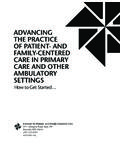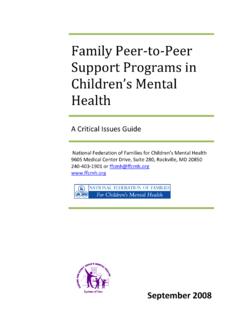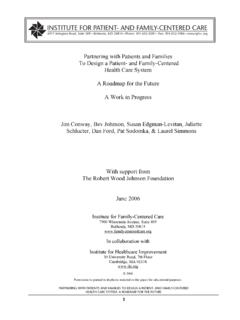Transcription of HIPAA Privacy and Security Rules and Joint Commission ...
1 FACT SHEET. HIPAA Privacy and Security Rules and Joint Commission Standards Are NOT Barriers to Advancing Patient- and Family-Centered Care and Building Partnerships with Patients and Families NOVEMBER 2013. Many hospitals and practices have questions about how to abide by HIPAA Privacy and Security Rules while also working to advance patient- and family-centered care and partner with patients and families. In addition, many hospitals want to ensure that they adhere to Joint Commission standards. Concerns about violating HIPAA Privacy and Security Rules and Joint Commission standards or an incomplete understanding of the Rules and/or standards often prevent the sharing of important information with patients and families. It is important to note that HIPAA gives patients the right to see and receive a copy of their health information; there is no wording within the HIPAA Privacy and Security Rules or the Joint Commission standards that prohibits health care providers from sharing information with patients and designated family members or partnering with patients and families either at the point-of-care or in governance.
2 Furthermore, it should be noted that the Joint Commission is supportive of both patient and family engagement and of partnering with patients and families in health care redesign and improvement ( , patient and family advisory councils) to achieve quality and safety goals. This document highlights frequently cited concerns and offers ways to address them. Point-of-Care Examples Rounds and Nursing Change of Shift Reports at the Bedside Rounding and change of shift reports at the bedside enable patients and their designated family members to participate in discussions about the patient's health and treatment. When encouraged to actively participate, patients and family members share critical information with health care providers in these discussions. 1875 Connecticut Avenue, NW | Suite 650 | Washington, DC 20009. | Concerns: In rooms with multiple beds, does rounding or change of shift at the bedside (in earshot of other patients) violate HIPAA Rules or Joint Commission standards?
3 How do we ensure patient Privacy when interacting with family members? HIPAA allows for normal hospital and physician operations. Clinicians are freely allowed to discuss patient care for treatment purposes, and conversations may take place with patients and designated family members, unless the patient objects. Consider that, in multi-bed rooms, patient health information is commonly/frequently shared in ways that could be overheard by others in the course of providing care (for example, a nurse may comment to a patient on her blood pressure, or a physician may discuss discharge plans with a patient). HIPAA is intended to support greater patient control over their health information, and the sharing of patient information to improve care and safety. Participation in rounds or change of shift reports allows patients and family members to take greater control over their health and health information by: (1) learning about the patient's condition, medications, treatments, symptoms, and problems to look out for, and (2).
4 Providing additional helpful information to providers. There is nothing in the Joint Commission standards that prohibit rounding or nurse change of shift report at the bedside. In fact, the Joint Commission has expressed explicit support for family involvement. Additional Suggestions Design bedside change of shift reporting and rounding protocols to be sensitive to patient Privacy needs. Involving patient and family advisors in designing or adapting these processes will help to ensure that patients and families are appropriately involved in their care and comfortable that their Privacy is respected. Some potential strategies to consider include: At the beginning of a hospital stay, describe to patients and designated family members the process for rounding and change of shift report at the bedside. Be sure they understand that conversations may be overheard in shared rooms.
5 Ask patients and families if they would like to participate in rounds and change of shift reporting at the bedside. Ask patients to identify designated family members and whether there are issues they would prefer to remain private if rounds or nursing shift reports are conducted with family members present. Ask the patient (and for a child or an incapacitated adult, the authorized parent, guardian, or designated proxy) to identify any family members who should not participate in rounds or other discussions with staff. Consider environmental changes to help safeguard Privacy while promoting more patient- and family-centered care for example, soundproof dividers or curtains for semi-private rooms. NATIONAL PARTNERSHIP FOR WOMEN & FAMILIES | FACT SHEET | HIPAA Privacy AND Security Rules 2. Encouraging Family Presence Family members are not visitors they provide critical support for patients during and after a hospital stay, and are an important resource for patients' care teams.
6 In recognition of the important role of families, many hospitals are moving away from traditional visiting hours and adopting policies that encourage family presence and participation. Concerns: If my hospital encourages family presence in lieu of visiting hours , won't it be more difficult for providers to talk about sensitive medical information with patients? How can hospitals support family presence while protecting patient Privacy ? Ask patients to identify the family members they would and would not like to participate in their care, and how they would like to involve them. This will ensure sensitive patient health information is shared according to their wishes. In the case of shared rooms, provide guidance to patients and their families that will help them be respectful of other patients and families who share the same patient room ( keep information they might hear confidential).
7 Engage patient and family advisors in developing guidelines for family presence that involve family members according to the patient's wishes. This work could include drafting sample language that personnel could use to deal with difficult situations, such as family members who demand access to personal health information against patient wishes. Governance Examples Patient and Family Advisor Participation in Governance Involving patients and families in quality improvement workgroups, patient safety task forces, and bodies such as patient and family advisory councils (PFACs) is a key strategy for delivering patient-and family-centered care and ensuring that the end-results meet the needs of patients and their families. In some case, these bodies review data on readmission rates, medical errors, or quality and safety information. Concerns: How can hospitals and practices make sure they are adhering to HIPAA Privacy and Security Rules and/or Joint Commission standards while including patient and family advisors in these important discussions?
8 Conduct HIPAA trainings for patient and family advisors to ensure they understand the HIPAA Privacy and Security Rules and their role in ensuring adherence to HIPAA . Rules . Conduct background checks on advisors who will be involved in regular ongoing task forces, committees, councils, and boards. NATIONAL PARTNERSHIP FOR WOMEN & FAMILIES | FACT SHEET | HIPAA Privacy AND Security Rules 3. Create guidelines on information-sharing and confidentiality that all advisors are asked to follow and require that all advisors sign a confidentiality statement. Sample wording: As a non-employed committee member, you may have access to protected health information. It is important that you recognize that any protected health information can only be used and disclosed as permitted by law. This information cannot be shared by written, verbal, or e-mail communication at school or home; with friends or family; or outside the hospital, clinic, or other health care facility unless specifically permitted by law.
9 De-identify sensitive data prior to consideration by any governance bodies to comply with HIPAA 's minimum necessary standard. Important Steps for Success 1. Communicate clearly with clinicians, staff, patients and families that information sharing is a priority and key to delivering high quality, safe care. 2. Implement policies and processes that encourage information sharing. 3. Provide all employees with training and guidance about how to share information in ways that adhere to HIPAA Privacy and Security Rules and Joint Commission standards. Because of current misconceptions, it will be important to emphasize to all employees that there is no wording within the HIPAA Privacy and Security Rules or the Joint Commission standards that prohibits health care providers from sharing information with patients and designated family members or partnering with patients and families either at the point-of-care or in governance.
10 Engage the Risk Management Department and ask personnel to clarify any misconceptions about the HIPAA Privacy and Security Rules . Resources Guide to Patient and Family Engagement in Hospital Quality and Safety. AHRQ (June 2013) Available at: HIPAA Providing New Opportunities for Collaboration. Institute for Patient- and Family- Centered Care (2004). Available at: Essential Allies Patient, Resident, and Family Advisors: A Guide for Staff Liaisons. Institute for Patient and Family-Centered Care (2013). Available at: Changing Hospital Visiting Policies and Practices: Supporting Family Presence and Participation. Institute for Patient- and Family-Centered Care (August 2010). NATIONAL PARTNERSHIP FOR WOMEN & FAMILIES | FACT SHEET | HIPAA Privacy AND Security Rules 4.




